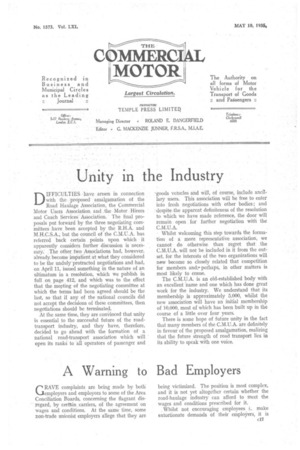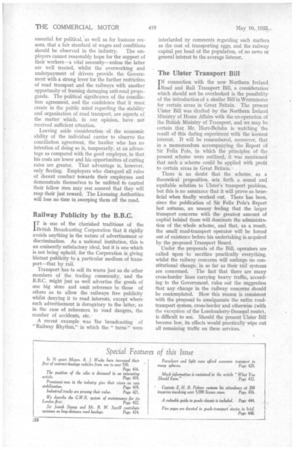A Warning to Bad Employers
Page 75

Page 76

If you've noticed an error in this article please click here to report it so we can fix it.
GRAVE complaints are being made by both employers and employees to some of the Area Conciliation Boards, concerning the flagrant disTegard, by certain carriers, of the agreement on wages and conditions. At the same time, some non-trade unionist employers allege that they are being victimized. The position is most complex, and it is not yet altogether certain whether the road-haulage industry can afford to meet the wages and conditions prescribed for it.
Whilst not encouraging employees L make extortionate demands of their emploYers, it is essential for political, as well as for humane reasons, that a fair standard of wages and conditions should be observed in the industry. The employers cannot reasonably hope for the support of their workers—a vital necessity—unless the latter are well treated, whilst the overworking and underpayment of drivers provide the Government with a strong lever for the further restriction of road transport and the railways with another opportunity of framing damaging anti-road propaganda. The political significance of the conciliation agreement, and the confidence that it must create in the public mind regarding the stability and organization of road transport, are aspects of the matter which, in our opinion, have not received sufficient attention.
Leaving aside consideration of the economic ability of the individual carrier to observe the conciliation agreement, the haulier who has no intention of doing so is, temporarily, at an advantage as compared with the good employer, in that his costs are lower and his opportunities of cutting rates are greater. That advantage is, however, only fleeting. Employers who disregard all rules of decent conduct towards their employees and demonstrate themselves to be unfitted to control their fellow men may rest assured that they will reap their just reward. The Licensing Authorities will lose no time in sweeping them off the road.
Railway Publicity by the B.B.C.
IT is one of the cherished traditions of the British Broadcasting Corporation that it rigidly avoids anything in the nature of advertisement or discrimination. As a national institution, this is an eminently satisfactory ideal, but it is one which is not being upheld, for the Corporation is giving blatant publicity to a particular medium of transport—that by rail.
Transport has to sell its wares just as do other members of the trading community, and the B.B.C. might just as well advertise the goods of one big store and omit reference to those of others as to allow the railways free publicity whilst denying it to road interests, except where such advertisement is derogatory to the latter, as in the case of references to road dangers, the number of accidents, etc.
A recent example was the broadcasting of " Railway Rhythm," in which the " turns" were interlarded Jay comments regarding such matters as the cost of transporting eggs, and the railway capital per head of the population, of no news or general interest to the average listener.
The Ulster Transport Bill
IN connection with the new Northern Ireland Road and Rail Transport Bill, a consideration which should not be overlooked is the possibility of the introduction of a similar Bill in Westminster for certain areas in Great Britain. The present Ulster Bill was drafted by the Northern Ireland Ministry of Home Affairs with the co-operation of the British Ministry of Transport, and we may be certain that Mr. Hore-Belisha is watching the result of this dating experiment with the keenest interest. It will be remembered, moreover, that in a memorandum accompanying the Report of Sir Felix Pole, in which the principles of the present scheme were outlined, it was mentioned that such a scheme could be applied with profit to certain areas in Great Britain..
There is no doubt that the scheme, as a theoretical proposition, sets forth a sound and equitable solution to Ulster's transport problem, but this is no assurance that it will prove so beneficial when finally worked out. There has been, since the publication of Sir Felix Pole's Report last autumn, an uneasy feeling that the larger tiansport concerns with the greatest amount of capital behind them will dominate the administration of the whole scheme, and that, as a result, the small road-transport operator will be forced out of existence before his undertaking is acquired by the proposed Transport Board.
Under the proposals of the Bill, operators are called upon to sacrifice practically everything, whilst the railway concerns will undergo no constitutional change, in so far as their rail systems are concerned. The fact that there are many cross-border lines carrying heavy traffic, according to the Government, rules out the suggestion that any change in the railway concerns should be contemplated. How this reason is consistent with the proposal to amalgamate the entire roadtransport system, cross-border and otherwise (with the exception of the Londonderry-Donegal route), is difficult to see. Should the present Ulster Bill become law, its effects would practically wipe out all remaining traffic on these services.




































































































































































